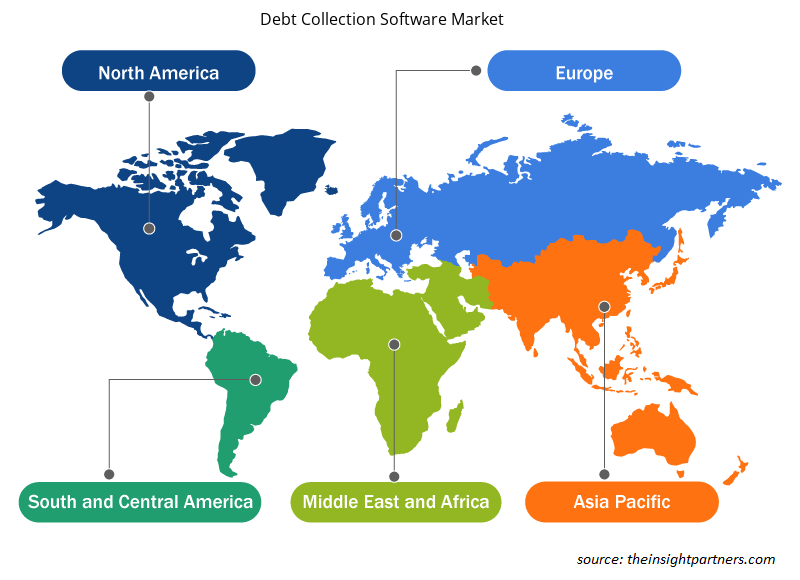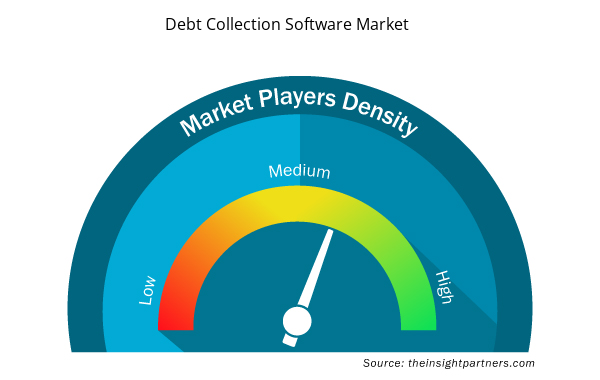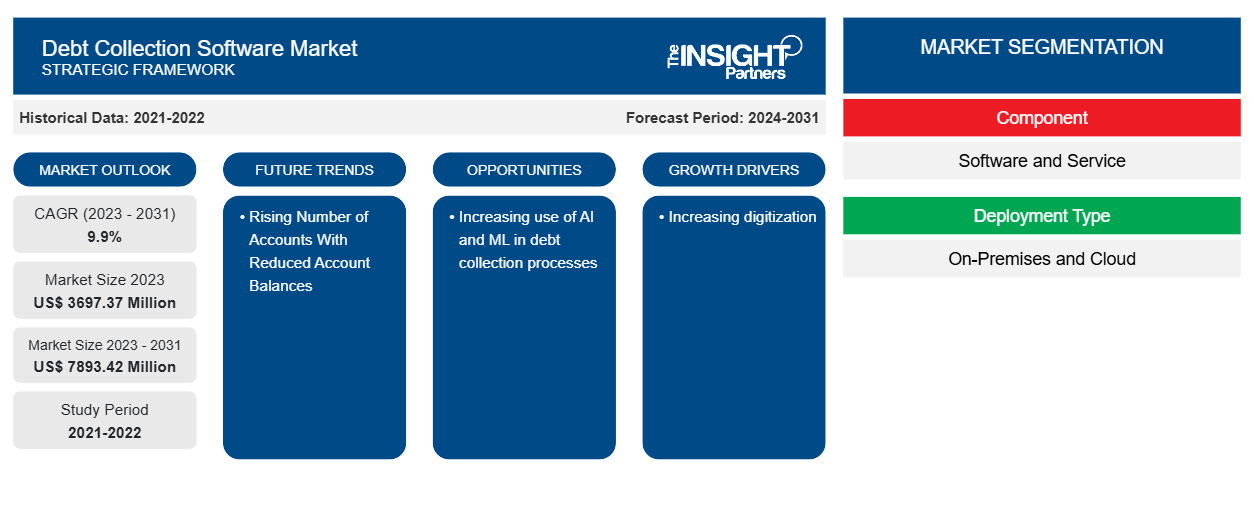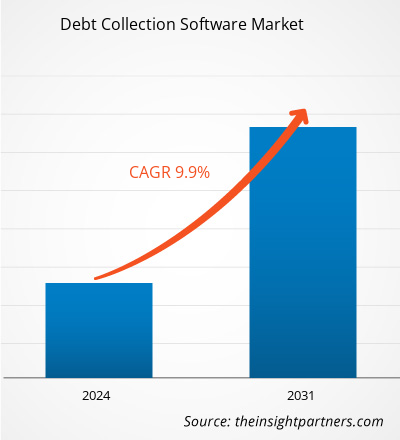من المتوقع أن يصل حجم سوق برامج تحصيل الديون إلى 7893.42 مليون دولار أمريكي بحلول عام 2031 من 3697.37 مليون دولار أمريكي في عام 2023. ومن المتوقع أن يسجل السوق معدل نمو سنوي مركب بنسبة 9.9٪ خلال الفترة 2023-2031. ومن المرجح أن يظل العدد المتزايد من الحسابات ذات الأرصدة المنخفضة يمثل اتجاهًا رئيسيًا في السوق.
تحليل سوق برامج تحصيل الديون
يقدم برنامج تحصيل الديون فوائد مختلفة. فهو يجمع كل ملفات تعريف المدينين في مكان واحد، بما في ذلك عنوانهم ومعلومات بطاقة الائتمان والرصيد الحالي وتقرير شامل عن المدفوعات المتأخرة للدين، مثل المبلغ وعمر الدين وما إلى ذلك. ومن الضروري تبادل المعلومات بين الدائنين وDCA فيما يتعلق بملف تعريف المدين وموقعه ومعلومات الاتصال والمعلومات الإضافية المتعلقة بديونه وما إلى ذلك. ويُعَد الاستعانة بمصادر خارجية (BPO) اسمًا آخر لهذه العملية الخاصة بمشاركة البيانات. ويمكن استخدام البرامج وواجهات برمجة التطبيقات لتحصيل الديون لجمع الرسوم من كل من الشركات والمستهلكين. وبالتالي، مع هذه الفوائد، ينمو سوق برامج تحصيل الديون.
نظرة عامة على سوق برامج تحصيل الديون
يتم استخدام برامج تحصيل الديون لأتمتة العمليات المختلفة المشاركة في تحصيل الديون. تعمل أتمتة عملية الأعمال هذه على تبسيط العديد من مكونات عملية تحصيل الديون وإزالة الاحتكاك لتمكين جهود تحصيل أكثر فعالية وكفاءة. يؤدي الاتصال والتفاعل في قناتهم في الوقت المناسب إلى تحسين كيفية إدراك العملاء للأعمال وتحديد احتمالية تحقيق نتيجة ناجحة. من خلال إضافة جميع العناصر التي توفر محادثات فعالة وفعّالة مثل القنوات الرقمية. ستعمل الأتمتة والمشاركة المختلطة وواجهات برمجة التطبيقات والذكاء الاصطناعي على تحويل كيفية تفاعل العملاء وتوليد المزيد من المدفوعات بشكل أسرع.
قم بتخصيص هذا التقرير ليناسب متطلباتك
ستحصل على تخصيص لأي تقرير - مجانًا - بما في ذلك أجزاء من هذا التقرير، أو تحليل على مستوى الدولة، وحزمة بيانات Excel، بالإضافة إلى الاستفادة من العروض والخصومات الرائعة للشركات الناشئة والجامعات
- احصل على أهم اتجاهات السوق الرئيسية لهذا التقرير.ستتضمن هذه العينة المجانية تحليلاً للبيانات، بدءًا من اتجاهات السوق وحتى التقديرات والتوقعات.
محركات وفرص سوق برامج تحصيل الديون
زيادة الرقمنة
لقد أدى جائحة كوفيد-19 إلى تسريع إدخال المعاملات غير النقدية. إن الخدمات المصرفية الرقمية هي القاعدة، وبما أن تحصيل الديون ينطوي على معاملات مالية، فمن الواضح أن الرقمنة مسؤولة عن البنوك ووكالات تحصيل الديون. ومع زيادة حالات التخلف عن السداد، تستخدم مؤسسات الإقراض في جميع أنحاء العالم بشكل متزايد تقنيات تحصيل الديون الرقمية لتعزيز معدلات تحصيلها بطريقة فعالة من حيث التكلفة. لذلك، فإن الرقمنة المتزايدة تدفع سوق برامج تحصيل الديون.
زيادة استخدام الذكاء الاصطناعي والتعلم الآلي في عمليات تحصيل الديون
باستخدام الذكاء الاصطناعي والتعلم الآلي، تستخدم منصات تحصيل الديون الرقمية استراتيجيات مختلفة لزيادة الكفاءة. يحصل القليل منها على بيانات بالغة الأهمية من مصادر وقنوات متعددة. يمكن أن تتضمن هذه البيانات معلومات مثل ملف تعريف المقترضين ودخلهم وخياراتهم وتاريخهم الائتماني والمالي وسجلات السداد لإنشاء شرائح صغيرة ذكية، مما يعزز كفاءة استراتيجيات التحصيل التقليدية التي يستخدمها المقرض. وبالتالي، فإن زيادة استخدام الذكاء الاصطناعي والتعلم الآلي في عمليات تحصيل الديون يزيد من الفرص المتاحة للسوق.
تقرير تحليل تجزئة سوق برامج تحصيل الديون
إن القطاعات الرئيسية التي ساهمت في استخلاص تحليل سوق برامج تحصيل الديون هي المكون ونوع النشر وحجم المنظمة والقطاع الرأسي.
- بناءً على المكون، ينقسم سوق برامج تحصيل الديون إلى برامج وخدمات. احتل القطاع المخصص حصة سوقية أكبر في عام 2023.
- بحسب نوع النشر، يتم تقسيم السوق إلى محلي وسحابي. احتلت شريحة التركيب على السطح حصة سوقية أكبر في عام 2023.
- بحسب حجم المنظمة، يتم تقسيم السوق إلى الشركات الكبيرة والشركات الصغيرة والمتوسطة.SMEs.
- بحسب حجم المنظمة، يتم تقسيم السوق إلى تكنولوجيا المعلومات والاتصالات، والخدمات المصرفية والمالية والتأمين، والتجزئة، والتصنيع، وغيرها.BFSI, retail, manufacturing, and others.
تحليل حصة سوق برامج تحصيل الديون حسب المنطقة الجغرافية
ينقسم النطاق الجغرافي لتقرير سوق برامج تحصيل الديون بشكل أساسي إلى خمس مناطق: أمريكا الشمالية، ومنطقة آسيا والمحيط الهادئ، وأوروبا، والشرق الأوسط وأفريقيا، وأمريكا الجنوبية والوسطى.
تهيمن منطقة آسيا والمحيط الهادئ على سوق برامج تحصيل الديون. ويشهد سوق برامج تحصيل الديون في هذه المنطقة نموًا بسبب عوامل مختلفة، مثل زيادة المبادرات الحكومية لتحسين وضوح إضاءة الأنفاق ووجود صناعة نقل راسخة. dominates the debt collection software market. The debt collection software market in this region is growing due to various factors, such as increasing government initiatives to improve the visibility of tunnel lighting and the presence of a well-established transportation industry.
رؤى إقليمية حول سوق برامج تحصيل الديون
لقد قام المحللون في Insight Partners بشرح الاتجاهات والعوامل الإقليمية المؤثرة على سوق برمجيات تحصيل الديون طوال فترة التوقعات بشكل شامل. يناقش هذا القسم أيضًا قطاعات سوق برمجيات تحصيل الديون والجغرافيا في جميع أنحاء أمريكا الشمالية وأوروبا ومنطقة آسيا والمحيط الهادئ والشرق الأوسط وأفريقيا وأمريكا الجنوبية والوسطى.

- احصل على البيانات الإقليمية المحددة لسوق برامج تحصيل الديون
نطاق تقرير سوق برامج تحصيل الديون
| سمة التقرير | تفاصيل |
|---|---|
| حجم السوق في عام 2023 | 3697.37 مليون دولار أمريكي |
| حجم السوق بحلول عام 2031 | 7893.42 مليون دولار أمريكي |
| معدل النمو السنوي المركب العالمي (2023 - 2031) | 9.9% |
| البيانات التاريخية | 2021-2022 |
| فترة التنبؤ | 2024-2031 |
| القطاعات المغطاة | حسب المكون
|
| المناطق والدول المغطاة | أمريكا الشمالية
|
| قادة السوق وملفات تعريف الشركات الرئيسية |
|
كثافة اللاعبين في سوق برامج تحصيل الديون: فهم تأثيرها على ديناميكيات الأعمال
يشهد سوق برامج تحصيل الديون نموًا سريعًا، مدفوعًا بالطلب المتزايد من جانب المستخدم النهائي بسبب عوامل مثل تفضيلات المستهلكين المتطورة والتقدم التكنولوجي والوعي المتزايد بفوائد المنتج. ومع ارتفاع الطلب، تعمل الشركات على توسيع عروضها والابتكار لتلبية احتياجات المستهلكين والاستفادة من الاتجاهات الناشئة، مما يؤدي إلى زيادة نمو السوق.
تشير كثافة اللاعبين في السوق إلى توزيع الشركات أو المؤسسات العاملة في سوق أو صناعة معينة. وهي تشير إلى عدد المنافسين (اللاعبين في السوق) الموجودين في مساحة سوق معينة نسبة إلى حجمها أو قيمتها السوقية الإجمالية.
الشركات الرئيسية العاملة في سوق برمجيات تحصيل الديون هي:
- شركة تشيتو
- فيكو
- شركة سي اس اس
- شركة إكسبيريان لحلول المعلومات
- إكسوس
- حلول لوكسون
إخلاء المسؤولية : الشركات المذكورة أعلاه ليست مرتبة بأي ترتيب معين.

- احصل على نظرة عامة على أهم اللاعبين الرئيسيين في سوق برمجيات تحصيل الديون
أخبار سوق برامج تحصيل الديون والتطورات الأخيرة
يتم تقييم سوق برامج تحصيل الديون من خلال جمع البيانات النوعية والكمية بعد البحث الأولي والثانوي، والذي يتضمن منشورات الشركات المهمة وبيانات الجمعيات وقواعد البيانات. فيما يلي بعض التطورات في سوق برامج تحصيل الديون:
- استبدل مستشفى زيورخ الجامعي (USZ) حل تحصيل الديون السابق المستند إلى SAP بـ Robo-Inkasso من Tilbago AG. ووفقًا لـ USZ، يساعد هذا في تقليل الجهد اليدوي الإجمالي، وبالتالي التكاليف الإجمالية المتضمنة مع تقديم نطاق أكبر من الخدمات. (المصدر: مستشفى زيورخ الجامعي (USZ)، بيان صحفي، ديسمبر 2022)
- أعلنت شركة تالي، وهي شركة ناشئة في مجال التكنولوجيا المالية معروفة بمساعدة الأشخاص على سداد ديون بطاقات الائتمان بجدية، عن إطلاق برنامج إدارة ديون بطاقات الائتمان الخاص بها. ويوسع هذا العرض المقدم للشركات مهمة تالي لمنح المستهلكين مسارًا أفضل لإدارة الديون. ومن المقرر أن يطلق الشريك الأول لتالي، وهي شركة استهلاكية كبيرة مدرجة في البورصة ولديها أكثر من 50 مليون مستخدم، برنامج تالي لمستخدميها في يوليو 2024. جمعت تالي رأس مال إضافيًا من المستثمرين الحاليين لتطوير عرضها المقدم للشركات، وحتى الآن جمعت أكثر من 200 مليون دولار لبناء وتوسيع نطاق المنصة. (المصدر: تالي، بيان صحفي، أبريل 2022)
تقرير سوق برامج تحصيل الديون والتغطية والنتائج
يوفر تقرير "حجم سوق برامج تحصيل الديون والتوقعات (2021-2031)" تحليلاً مفصلاً للسوق يغطي المجالات التالية:
- حجم سوق برامج تحصيل الديون وتوقعاته على المستويات العالمية والإقليمية والوطنية لجميع قطاعات السوق الرئيسية التي يغطيها النطاق
- اتجاهات سوق برامج تحصيل الديون بالإضافة إلى ديناميكيات السوق مثل المحركات والقيود والفرص الرئيسية
- تحليل مفصل لقوى PEST/Porter الخمس وSWOT
- تحليل سوق برامج تحصيل الديون الذي يغطي اتجاهات السوق الرئيسية والإطار العالمي والإقليمي واللاعبين الرئيسيين واللوائح والتطورات الأخيرة في السوق
- تحليل المشهد الصناعي والمنافسة الذي يغطي تركيز السوق، وتحليل خريطة الحرارة، واللاعبين البارزين، والتطورات الأخيرة في سوق برامج تحصيل الديون
- ملفات تعريف الشركة التفصيلية
- التحليل التاريخي (سنتان)، السنة الأساسية، التوقعات (7 سنوات) مع معدل النمو السنوي المركب
- تحليل PEST و SWOT
- حجم السوق والقيمة / الحجم - عالميًا وإقليميًا وقطريًا
- الصناعة والمنافسة
- مجموعة بيانات Excel



Report Coverage
Revenue forecast, Company Analysis, Industry landscape, Growth factors, and Trends

Segment Covered
This text is related
to segments covered.

Regional Scope
North America, Europe, Asia Pacific, Middle East & Africa, South & Central America

Country Scope
This text is related
to country scope.
الأسئلة الشائعة
The expected CAGR of the global debt collection software market is 9.9%.
The global debt collection software market is expected to reach US$ 7893.42 million by 2031.
The key players holding majority shares in the global debt collection software market are Chetu Inc., FICO, CSS, Inc., Experian Information Solutions Inc., EXUS, Loxon Solutions, FIS, Pegasystems Inc., Quantrax Corporation, Inc., and CGI Inc.
The rising number of accounts with reduced account balances is anticipated to play a significant role in the global debt collection software market in the coming years.
Increasing digitization and increasing use of AI and ML in debt collection processes are the major factors that propel the global debt collection software market.
Europe dominates the debt collection software market.
Trends and growth analysis reports related to Technology, Media and Telecommunications : READ MORE..
The Insight Partners performs research in 4 major stages: Data Collection & Secondary Research, Primary Research, Data Analysis and Data Triangulation & Final Review.
- Data Collection and Secondary Research:
As a market research and consulting firm operating from a decade, we have published and advised several client across the globe. First step for any study will start with an assessment of currently available data and insights from existing reports. Further, historical and current market information is collected from Investor Presentations, Annual Reports, SEC Filings, etc., and other information related to company’s performance and market positioning are gathered from Paid Databases (Factiva, Hoovers, and Reuters) and various other publications available in public domain.
Several associations trade associates, technical forums, institutes, societies and organization are accessed to gain technical as well as market related insights through their publications such as research papers, blogs and press releases related to the studies are referred to get cues about the market. Further, white papers, journals, magazines, and other news articles published in last 3 years are scrutinized and analyzed to understand the current market trends.
- Primary Research:
The primarily interview analysis comprise of data obtained from industry participants interview and answers to survey questions gathered by in-house primary team.
For primary research, interviews are conducted with industry experts/CEOs/Marketing Managers/VPs/Subject Matter Experts from both demand and supply side to get a 360-degree view of the market. The primary team conducts several interviews based on the complexity of the markets to understand the various market trends and dynamics which makes research more credible and precise.
A typical research interview fulfils the following functions:
- Provides first-hand information on the market size, market trends, growth trends, competitive landscape, and outlook
- Validates and strengthens in-house secondary research findings
- Develops the analysis team’s expertise and market understanding
Primary research involves email interactions and telephone interviews for each market, category, segment, and sub-segment across geographies. The participants who typically take part in such a process include, but are not limited to:
- Industry participants: VPs, business development managers, market intelligence managers and national sales managers
- Outside experts: Valuation experts, research analysts and key opinion leaders specializing in the electronics and semiconductor industry.
Below is the breakup of our primary respondents by company, designation, and region:

Once we receive the confirmation from primary research sources or primary respondents, we finalize the base year market estimation and forecast the data as per the macroeconomic and microeconomic factors assessed during data collection.
- Data Analysis:
Once data is validated through both secondary as well as primary respondents, we finalize the market estimations by hypothesis formulation and factor analysis at regional and country level.
- Macro-Economic Factor Analysis:
We analyse macroeconomic indicators such the gross domestic product (GDP), increase in the demand for goods and services across industries, technological advancement, regional economic growth, governmental policies, the influence of COVID-19, PEST analysis, and other aspects. This analysis aids in setting benchmarks for various nations/regions and approximating market splits. Additionally, the general trend of the aforementioned components aid in determining the market's development possibilities.
- Country Level Data:
Various factors that are especially aligned to the country are taken into account to determine the market size for a certain area and country, including the presence of vendors, such as headquarters and offices, the country's GDP, demand patterns, and industry growth. To comprehend the market dynamics for the nation, a number of growth variables, inhibitors, application areas, and current market trends are researched. The aforementioned elements aid in determining the country's overall market's growth potential.
- Company Profile:
The “Table of Contents” is formulated by listing and analyzing more than 25 - 30 companies operating in the market ecosystem across geographies. However, we profile only 10 companies as a standard practice in our syndicate reports. These 10 companies comprise leading, emerging, and regional players. Nonetheless, our analysis is not restricted to the 10 listed companies, we also analyze other companies present in the market to develop a holistic view and understand the prevailing trends. The “Company Profiles” section in the report covers key facts, business description, products & services, financial information, SWOT analysis, and key developments. The financial information presented is extracted from the annual reports and official documents of the publicly listed companies. Upon collecting the information for the sections of respective companies, we verify them via various primary sources and then compile the data in respective company profiles. The company level information helps us in deriving the base number as well as in forecasting the market size.
- Developing Base Number:
Aggregation of sales statistics (2020-2022) and macro-economic factor, and other secondary and primary research insights are utilized to arrive at base number and related market shares for 2022. The data gaps are identified in this step and relevant market data is analyzed, collected from paid primary interviews or databases. On finalizing the base year market size, forecasts are developed on the basis of macro-economic, industry and market growth factors and company level analysis.
- Data Triangulation and Final Review:
The market findings and base year market size calculations are validated from supply as well as demand side. Demand side validations are based on macro-economic factor analysis and benchmarks for respective regions and countries. In case of supply side validations, revenues of major companies are estimated (in case not available) based on industry benchmark, approximate number of employees, product portfolio, and primary interviews revenues are gathered. Further revenue from target product/service segment is assessed to avoid overshooting of market statistics. In case of heavy deviations between supply and demand side values, all thes steps are repeated to achieve synchronization.
We follow an iterative model, wherein we share our research findings with Subject Matter Experts (SME’s) and Key Opinion Leaders (KOLs) until consensus view of the market is not formulated – this model negates any drastic deviation in the opinions of experts. Only validated and universally acceptable research findings are quoted in our reports.
We have important check points that we use to validate our research findings – which we call – data triangulation, where we validate the information, we generate from secondary sources with primary interviews and then we re-validate with our internal data bases and Subject matter experts. This comprehensive model enables us to deliver high quality, reliable data in shortest possible time.


 احصل على عينة مجانية لهذا التقرير
احصل على عينة مجانية لهذا التقرير